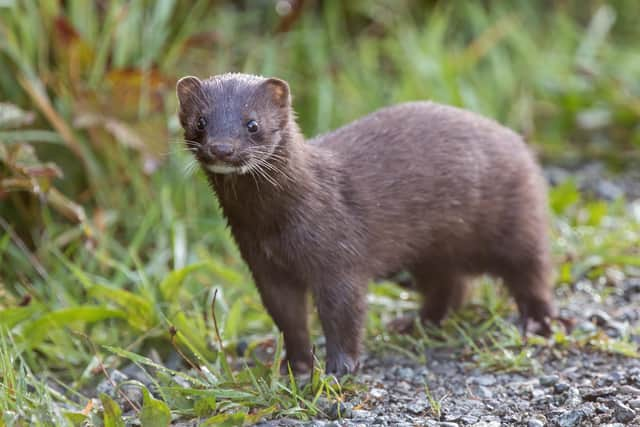Animal lover “shocked” by wildlife trust project to trap and kill American mink in Derbyshire
and live on Freeview channel 276
Darcey White, 40, discovered a job post for the role of two “project officers” with responsibility for organising trapping the carnivorous American mink.
However she has now vowed to cease all donations to Derbyshire Wildlife Trust (DWT), since discovering the plan to kill the “majestic animals”.
Advertisement
Hide AdAdvertisement
Hide AdThe job – now closed for applications since August 27 – seeks two workers for its “water vole recovery initiative” to “deliver or organise others to trap and remove” the small mammals.


Candidates for the roles – paid for by “external funding bodies”, says the Trust – are promised a salary of £24,450 with pension contributions of 9.5 per cent .
“Massive animal lover” Darcey says after contacting DWT about the culling programme she was told the mink would be “humanely killed”.
However, she said: “There isn’t a humane way to kill a healthy, wild animal. Trapped animals will fight to survive, biting at the cage until they collapse of exhaustion or someone comes to kill them.
Advertisement
Hide AdAdvertisement
Hide Ad"I would like the people of Derbyshire to know that the trust is recruiting two new employees to run a scheme to kill Derbyshire mink.
"I think that the animal loving-people of our amazing county would be saddened and appalled.”
Mink are classified as a non-native, “invasive” species in the UK.
The American native animals – which grow over half-a-metre from head to tail – were brought to the UK in the 1920s to be reared in fur farms.
Advertisement
Hide AdAdvertisement
Hide AdHowever following various escapes and deliberate releases they are thought to have been breeding in the wild since the mid-1950s – preying on the water vole and ground nesting birds.
DWT says salaries for the two new roles will be paid by “external funding bodies”, with no money coming from member donations.
The trust justifies the move saying continual predation and habitat fragmentation could see more water voles disappear from our waterways with a decline of 90 per cent in some areas already.
While it has become “critical” to act to help reverse the decline. However Darcey believes there are more ethical ways to reduce mink numbers.
Advertisement
Hide AdAdvertisement
Hide AdShe said: “In East Anglia they have found that a growing population of otters dramatically reduced the number of mink in their area.
“Let’s help nature to get back into balance rather than killing Mink.
"I can’t understand why Derbyshire Wildlife Trust would chose to cruelly kill mink rather than naturally control their numbers.
“Mink, like other wild animals, are opportunistic as their numbers increase depending on the available food and space.
Advertisement
Hide AdAdvertisement
Hide Ad"By introducing a bigger variety of species with the otters the numbers of mink will naturally and ethically reduce.”
Darcey also believes the "invasive”, “non-native”classification no longer applies to the American mink.
She said: “Mink didn’t row themselves here on a Viking longboat to savage our wildlife.
"They never wanted to be here – people brought them to Britain and they escaped the living hell that is a fur farm.
Advertisement
Hide AdAdvertisement
Hide Ad“They are estimated to have been breeding in the wild in Britain from 1956. The wild mink population is estimated to be just 47,000 in for the whole of England and has declined over the last 25 years.
“They are predators like many of our beloved mammals but they have every right to live as much as any wild animal.”
Responding to Darcey’s comments, a spokesperson for Derbyshire Wildlife Trust said mink posed a “considerable risk” to many UK native species including the water vole, ground nesting birds such as moorhen, little grebe and coot and our native fish species.
“They added: “With continual predation and habitat fragmentation we could see more water voles disappear from our waterways and with already up to 90 per cent declines in some areas.
"It has become critical to act to help reverse the decline. Water voles have not co-evolved with American mink and therefore do not have the strategies to avoid them.”